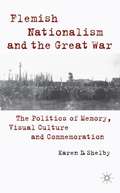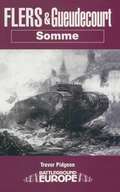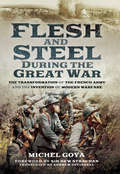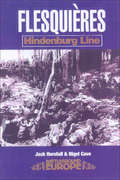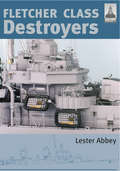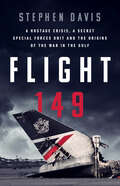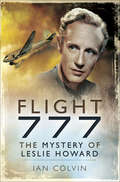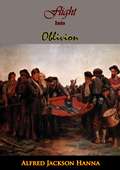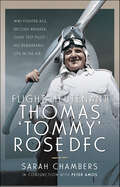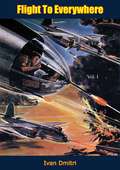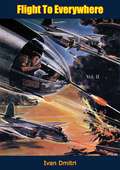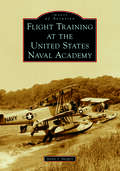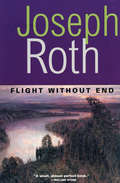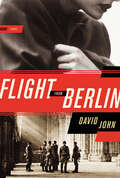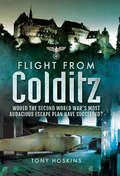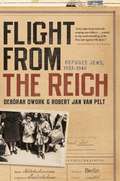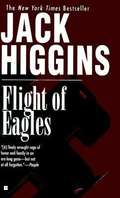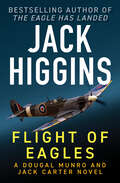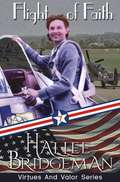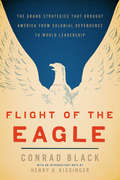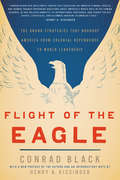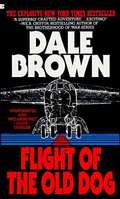- Table View
- List View
Flemish Nationalism and the Great War
by Karen D. ShelbyKaren Shelby addresses the IJzertoren Memorial, which is dedicated to the Flemish dead of the Great War, and the role the monument has played in the discussions among the various political, social and cultural ideologies of the Flemish community.
Flers & Gueudecourt: Somme
by Trevor PidgeonFlers is of course best remembered for the first use of tanks in modern war. But the battles at Flers and Gueudecourt were also memorable as forming part of the last great advance of the British Army in this slogging match that was the Battle of the Somme in 1916.
Flesh and Steel During the Great War: The Transformation of the French Army and the Invention of Modern Warfare
by Andrew Uffindell Michael GoyaThe noted military historian presents an illuminating study of trench warfare during WWI—and how it influenced the French Army’s evolution.Michel Goya’s Flesh and Steel during the Great War is a major contribution to our understanding of the French Army’s experience on the Western Front, and how that experience impacted the future of its military theory and practice. Goya explores the way in which the senior commanders and ordinary soldiers responded to the extraordinary challenges posed by the mass industrial warfare of the early twentieth century.In 1914 the French army went to war with a flawed doctrine, brightly-colored uniforms and a dire shortage of modern, heavy artillery. How then, over four years of relentless, attritional warfare, did it become the great, industrialized army that emerged victorious in 1918?To show how this change occurred, the author examines the pre-war ethos and organization of the army. He describes in telling detail how, through a process of analysis and innovation, the French army underwent the deepest and fastest transformation in its history.
Flesquieres–Hindenburg Line: Hindenburg Line (Battleground Europe)
by Nigel Cave Jack HorsfallThe third in a trilogy of books, the others being Cambrai -The Right Hook and Bourlon Wood by the same authors covering the battle for Cambrai in November 1917. It covers the defense against the German counter strike, the defense of the Flesquieres Salient against the Kaiserschlact in March 1918 and its recapture in Sept/Oct 1918 all key elements in great Allied advance to victory. This book and guide to the Battle for Flesquieres Ridge tells of the onslaught by 470 tanks and infantry battalions which smashed through the Hindenburg line to the great surprise of the Germans who thought it invincible. So successful was the initial assault that for the first time in the war church bells rang out and the face of land warfare was changed forever. The story illustrates the indomitable spirit of British infantry who in spite of being outnumbered and outgunned, and frustrated by political interference, still managed to thwart Ludendorff's last drive for the Channel Ports. They were then in a position to force him back eastwards, breaking through the reinforced Hindenburg Line once again before final victory in November 1918.
Fletcher Class Destroyers (Shipcraft Ser.)
by Lester AbbeyThe 'ShipCraft' series provides in-depth information about building and modifying model kits of famous warship types. Lavishly illustrated, each book takes the modeller through a brief history of the subject class, using scale plans to highlight differences between sisterships and changes in their appearance over their careers, then moves to an extensive photographic survey of either a high-quality model or a surviving example of the ship. Hints on building the model, and on modifying and improving the basic kit, are followed by a section on paint schemes and camouflage, featuring numerous colour profiles and highly-detailed line drawings. The strengths and weaknesses of available kits of the ships are reviewed, and the book concludes with a section on research references—books, monographs, large-scale plans and relevant websites. The subject of this volume is the Fletcher class, often considered the most successful of all American destroyers. Built to the first design that was freed from treaty restrictions, they came into service near the beginning of the Pacific War and fought with distinction through all the most ferocious of the campaigns against Japan. They were constructed in large numbers, with a number of variations, and their popularity is reflected by the wide range of available kits.
Flight 149: A Hostage Crisis, a Secret Special Forces Unit, and the Origins of the Gulf War
by Stephen DavisA gripping, real-life drama that reveals the true story of a plane full of unsuspecting passengers who landed in a war zone and were delivered into the hands of a murderous dictator. On August 1, 1990, Flight 149 was scheduled for its routine London-to-Kuala Lumpur run. But when the plane, carrying 385 passengers and crew, landed at a Kuwait airport to refuel that day, it was surrounded by Iraqi tanks and about to be bombed by fighter jets. The passengers and crew were kept as hostages and suffered brutal treatment including violent attacks, sexual assaults, and mock executions. When the survivors were eventually released, they were never told why their plane landed in the middle of an invasion, or who a mysterious team of late arrivals on the flight might have been. Their story was overshadowed by the ensuing Gulf War. Until now. In Flight 149, Stephen Davis draws on unique witness accounts from the hostages, and uncovers the lies and coverups orchestrated by the British secret service and CIA. This story reveals an astonishing misuse of intelligence that changed the course of history and forever altered the relationship between the West and the Middle East.
Flight 777: The Mystery of Leslie Howard
by Ian ColvinOn 1 June 1943 Flight 777, a Douglas DC-3, en route from Lisbon to Britain, was shot down over the Bay of Biscay by German aircraft. Among the dead was the actor Leslie Howard, who had returned from Hollywood to England to help the British war effort. Also on board was Howards tax adviser, Alfred Chenhalls, who smoked cigars and looked remarkably like Winston Churchill. Did the Germans believe that Churchill was on board Flight 777? Other aircraft flying that route went unmolested by the Luftwaffe in spite of the German air presence over the Bay of Biscay. These flights were operated by Dutch crews flying aircraft of KLM, which were on charter to BOAC, and it was an experience Dutch crew that was lost that day. Ian Colvin carried out an exhaustive investigation into the incident, including interviewing former Luftwaffe personnel and this book, first published in 1957, is the result of his endeavors.
Flight Into Oblivion
by Alfred Jackson HannaA well-researched and exciting tale of the flight of the Confederate Cabinet after the Southern defeat at the end of American Civil War, this book broke new ground, uncovered many new facts and was firmly established Alfred Jackson Hanna as a historical scholar.Hanna begins with General Lee's fatal telegram and the hasty exodus of Jefferson Davis and high officials to Danville, then Greensboro and Charlotte. From there the Confederate Cabinet dispersed, and the author follows each man's adventurous course in detail. Most of the fugitives headed for the pine barrens and scrub lands of Florida but were soon apprehended. Only John C. Breckinridge and Judah P. Benjamin successfully escaped, outwitting Federal officials and pirates along their way to Cuba. A classic work that makes for fabulous, spirited reading, Flight Into Oblivion, first published in 1938, soars once again.
Flight Lieutenant Thomas 'Tommy' Rose DFC: WWI Fighter Ace, Record Breaker, Chief Test Pilot—His Remarkable Life in the Air
by Sarah ChambersFlight Lieutenant Thomas ‘Tommy’ Rose, a First World War fighter ace, was a pioneer of private flying. He installed and managed the UK’s first fuel pump for private aviation at Brooklands before becoming Sales Manager for Phillips and Powis Aircraft Ltd. The chief flying instructor at several early flying schools, Tommy became the Chief Test Pilot for Miles Aircraft and was the winner of air races and pageants. He was undoubtedly a pilot who could always be relied on to amaze the onlookers with his fast, accurate stunts and low-level flying. Mentioned in Despatches in 1916 and awarded the DFC in 1918, Tommy was attacked in his aircraft several times, yet his astonishing ability at the controls of his aircraft enabled him to land without serious injury. By the time of the Armistice, Tommy had been credited with eleven ‘kills’. He continued to demonstrate these skills after the war and though this true trailblazer was widely known in his glory days during the early part of the twentieth century, little is remembered about him today. Yet Tommy Rose achieved the most incredible feats of aviation and was considered one of the finest pilots of his era, completing over 11,200 flying hours up to 1949. In the 1930s, Tommy took the Imperial Airways route through East Africa, to set up a new world record on the UK to Cape Town passage, beating Amy Mollison (Johnson) who took the shorter course down the west coast. He also won the King's Cup Air Race in 1935. Tommy flew many of the early RAF fighters from Maurice Farman to the Spitfire Mk.IX, and, from late 1939, when he was appointed Chief Test Pilot for Phillip & Powis Aircraft Ltd at Woodley (forerunners of Miles Aircraft Ltd), he test flew all Miles monoplane training and target towing aircraft, leaving in January 1946. His last position was as General Manager of Universal Flying Services Ltd at Fairoaks Aerodrome in Surrey. The result of decades of research by the author, through this book the life and adventures of one of history’s most accomplished and daring aviators can finally be told.
Flight Through the Ages: A 50th Anniversary Tribute to the Guild of Aviation Artists
by Artists of Aviation“A joy . . . covers the period from the Great War to the modern era with diversions into air shows and some of the personalities of the Guild.” —War History OnlineFlight Through the Ages was the title of the first annual exhibition of the Guild of Aviation Artists in 1971. This book celebrates 50 years of exhibitions and includes paintings by almost one hundred Guild artists, past and present, depicting aircraft from the earliest airborne activities through to the present day. There are balloons and airships, fighters and bombers from both world wars, including Spitfires and Lancasters, airliners from the early years of air travel through Concorde and on to the present day. There are also gliders and helicopters and the current generation of advanced aircraft among some 200 illustrations, most in full color. Artists include some of the most well-known British artists of their day and the works display imagination and creativity in a variety of different styles and treatments that bring flying machines to life. There are historical scenes and aircraft in their natural environment, showing action and some of the aviators and others from the world of aviation. There is a short history of the Guild and a step-by-step guide to one artist’s approach to the subject.“A magnificent series of images in a variety of styles . . . This is a lovely book in which to browse, feast your eyes and ponder on the magic of aviation.” —Flying in Ireland“Inspiration, pure and simple . . . this book provides a luscious ready reference of many of aviation’s most beautiful creations, each in a moment in time that draws us into its story.” —IPMS/USA
Flight To Everywhere [With Illustrations] Vol. I (Flight To Everywhere #1)
by Ivan DmitriA PICTURE JOURNEY OVER 12,000 MILES OF AIR TRANSPORT COMMAND ROUTES THROUGH JUNGLE, DESERT AND ARCTICFirst published in 1944, this is the first part of a stunning book that provides an in-depth look at the far-flung operations of the Air Transport Command and Army Air Forces, and provides a valuable contribution to the understanding of America’s heroic air accomplishments.Richly illustrated throughout with photographs and sketches by Ivan Dmitri. A renowned U.S. artist and colour photography pioneer, Dmitri produced the first ever color photograph gracing the cover of the Saturday Evening Post’s edition dated May 29, 1937, and his second cover in 1944, depicting his photo of General ‘Hap’ Arnold with B-17’s flying overhead, proved so popular that the United States used the photo image to print a very rare World War II war effort poster.
Flight To Everywhere [With Illustrations] Vol. II (Flight To Everywhere #2)
by Ivan DmitriA PICTURE JOURNEY OVER 12,000 MILES OF AIR TRANSPORT COMMAND ROUTES THROUGH JUNGLE, DESERT AND ARCTICFirst published in 1944, this is the first part of a stunning book that provides an in-depth look at the far-flung operations of the Air Transport Command and Army Air Forces, and provides a valuable contribution to the understanding of America’s heroic air accomplishments.Richly illustrated throughout with photographs and sketches by Ivan Dmitri. A renowned U.S. artist and colour photography pioneer, Dmitri produced the first ever color photograph gracing the cover of the Saturday Evening Post’s edition dated May 29, 1937, and his second cover in 1944, depicting his photo of General ‘Hap’ Arnold with B-17’s flying overhead, proved so popular that the United States used the photo image to print a very rare World War II war effort poster.
Flight Training at the United States Naval Academy (Images of Aviation)
by Andre J. SwygertThe United States Naval Academy was founded in 1845 in Annapolis, Maryland, after experience showed that the policy of training naval officers solely through shipboard experience was ineffective. The development of aircraft in the early 20th century was a technological change that impacted the academy. The efforts of naval aviation advocates, led by Capt. Washington I. Chambers, resulted in the Navy acquiring its first aircraft in 1911 and basing them near the US Naval Academy where sufficient land and material resources were available to support flight operations. Later, under Supt. Adm. Louis W. Nulton, aviation entered the curriculum as an element of fundamental naval education, taking a place among major subjects such as seamanship and gunnery. Classroom instruction and indoctrination flights provided all midshipmen with a familiarization in aviation as an important element in their development as naval officers before circumstances forced a shift of training to other facilities by 1962.
Flight Without End (Peter Owen Modern Classic Ser.)
by Joseph RothFrom the celebrated author of The Radetzky March comes the tragic story of a WWI officer caught in the tumult of a world on the verge of modernity. As an Austro-Hungarian officer on the Eastern Front of World War I, Franz Tunda was captured by the Russians and sent to Siberia. Dreaming of a return to his life in Vienna, he escapes from prison—only to get caught up in the Russian Revolution, fall in love, and fight for the Bolshevik cause. Upon finally returning to Europe, Tunda finds that the old order is gone and the Europe he once knew has changed utterly. Disillusioned and without a land to call home, Joseph Roth&’s tragic hero is a masterful expression of the archetypal modern man taken up by the currents of history.
Flight from Berlin: A Novel
by David JohnA world-weary English reporter and a maverick American female Olympian find themselves caught in a lethal game between the Gestapo and British Secret Intelligence Service in David John’s spellbinding thriller Flight from Berlin. While traveling to Berlin on the Hindenburg to cover the 1936 Berlin Olympics, journalist Richard Denham meets socialite Eleanor Emerson, recently expelled from the U.S. swim team. Richard and Eleanor quickly discover the dark power of Hitler’s propaganda machine. Drawn together by danger and passion, Richard and Eleanor become involved in the high-stakes world of international intrigue must pull off a daring plan to survive the treachery of the Third Reich. But one wrong move could be their last. Flight from Berlin is a riveting story of love, courage, and betrayal that culminates in a breathtaking race against the forces of evil.
Flight from Colditz: Would the Second World War's Most Audacious Escape Plan Have Succeeded?
by Anthony HoskinsColditz Castle was one of the most famous Prisoner of War camps of the Second World War. It was there that the Germans interred their most troublesome or important prisoners. Hundreds of ingenious escape attempts were made but the most ambitious of all was to build a glider and fly to freedom.Though the glider was built, the war ended before it could be used, and it was subsequently destroyed. Using the original plans and materials used by the prisoners, in March 2012 a replica of the glider was constructed in a bid to see if the escape attempt would have succeeded. The glider was then launched from the roof of the castle roof.Anthony Hoskins is the man who built, and helped launch, the glider. As well as examining the story behind the building of the original glider, he details the construction of the replica and the nail-biting excitement as the Colditz Cock finally took to the skies. Packed with photos of the glider and its flight over Colditz, this is the inside story of the recreation of one of the most intriguing episodes of the Second World War.
Flight from the City: Moving to the Country; Fresh Food, a Large Rural Home, and a Relaxed, Happier Life
by Ralph BorsodiRalph Borsodi was among the first Americans to experiment in leaving the bustling city for a more relaxed, rural life – this book chronicles his progress, and includes many practical pointers.Like many urban workers, Ralph Borsodi found the non-stop pace of work and the stressful, competitive atmosphere to be damaging to his health and well-being. A new life away from New York City, one where he and his family could enjoy a closeness to nature, better food, and develop practical skills and knowhow, became his goal. Yet Borsodi found the transition from downtown office worker to rural homesteader was not easy, and certainly not for everybody.Borsodi is honest about the sacrifice that moving out of the city entails: one’s options for a social life are fewer, there are no theatres or sports stadiums for example. Challenges such as learning how to maintain one’s home and secure it against the elements, while having sufficient finance in place to buy a plot of land and to manage on while adapting to rural life, are described in detail.Flight from the City was popular when it first appeared in 1933, and its guidance inspired many Americans to follow in the author’s footsteps. Even today, much of the wisdom and experience Ralph Borsodi espouses is relevant and valuable for anyone thinking of pursuing a life in the country.-Print ed.
Flight from the Reich: Refugee Jews, 1933-1946
by Debórah Dwork Robert Jan van PeltAs persecution, war, and deportation savaged their communities, Jews tried to flee Nazi Europe through both legal and clandestine routes. In this riveting tale of Jewish refugees during and after the Nazi era, Debórah Dwork and Robert Jan van Pelt thread together official papers and personal accounts to weave the history of refugees’ lives into the history of the Holocaust.
Flight of Eagles (Dougal Munro and Jack Carter #3)
by Jack HigginsIn the early days of World War II, nations were forced to choose sides in the epic battle that would change history forever. But for two brothers, fate had already made the choice. Separated as boys, Max and Harry Kelso have grown up to become ace fighter pilots-Max with the German Luftwaffe and Harry in Britain': RAF. Now, the machinery of war has set in motion an intrigue so devious, so fill with peril, that it will require them to question everything they know, everything they hold most dear: their lives, their families, their loyalties. Against impossibl odds, it is their courage alone that will decide the course of the war...
Flight of Eagles (The Dougal Munro and Jack Carter Novels)
by Jack HigginsTwin brothers flying for opposing sides of World War II are caught in a lethal spy game in this New York Times–bestselling epic historical thriller. Born in the United States to an American World War I pilot and a German baroness, twin brothers Max and Harry Kelso are separated when their father is killed in a tragic accident. Their mother returns to Germany to raise Max, while Harry grows up with their millionaire grandfather. When World War II begins, the twins are unexpectedly reunited when they find themselves fighting on opposing sides of the conflict. Harry becomes a flying ace for Britain&’s RAF, while Max turns into one of the Luftwaffe&’s deadliest pilots. When the wrong people discover the brothers&’ connection, a deadly game of intrigue is set in motion. It will test their courage and their loyalties as it pushes them to their limits. Their lives—and the war—hang in the balance . . . &“[A] finely wrought saga of honor and family in an era long gone—but not at all forgotten.&” —People&“Almost unbearable suspense . . . As good as any book Higgins has penned—and that includes his most famous, The Eagle Has Landed . . . An amazing journey of twin brothers and the legacy they leave.&” —Abilene Reporter-News &“Fast-moving with his usual great characters and a surprise ending.&” —Sunday Oklahoman
Flight of Faith, a Novella: Virtues and Valor #7
by Hallee BridgemanHELEN MULBERRY, the youngest child and only daughter of a wealthy Texas oil tycoon, has always had her every wish granted immediately. When the Germans march into France, no one denies her request to fly her plane to England and help free up a male pilot for combat. Her father's influence opens doors, and 19 year old Helen joins the Virtues team. Now under the code-name FAITH, she flies between Britain and France, transporting passengers, supplies, or performing reconnaissance. The Nazis guard their skies with vigor, and Helen learns to fly in combat, land in a field with no lights, and evade the anti-aircraft fire. She masterfully takes on each mission, despite the perceptions and chauvinistic attitudes of many of the male pilots. Shot down over France during the mission to rescue the agent code named TEMPERANCE from the clutches of the Gestapo, Helen must make her way through enemy territory with no language skills and somehow come through with a means to get her team back to Britain. Can she save them, or will they all find that they have no way out?
Flight of the Eagle
by Conrad BlackLike an eagle, American colonists ascended from the gulley of British dependence to the position of sovereign world power in a period of merely two centuries. Seizing territory in Canada and representation in Britain; expelling the French, and even their British forefathers, American leaders George Washington, Benjamin Franklin, and Thomas Jefferson paved their nation's way to independence. With the first buds of public relation techniques-of communication, dramatization, and propaganda-America flourished into a vision of freedom, of enterprise, and of unalienable human rights.In Flight of the Eagle, Conrad Black provides a perspective on American history that is unprecedented. Through his analysis of the strategic development of the United States from 1754-1992, Black describes nine "phases" of the strategic rise of the nation, in which it progressed through grave challenges, civil and foreign wars, and secured a place for itself under the title of "Superpower." Black discredits prevailing notions that our unrivaled status is the product of good geography, demographics, and good luck. Instead, he reveals and analyzes the specific strategic decisions of great statesmen through the ages that transformed the world as we know it and established America's place in it.
Flight of the Eagle
by Conrad BlackLike an eagle, American colonists ascended from the gulley of British dependence to the position of sovereign world power in a period of merely two centuries. Seizing territory in Canada and representation in Britain; expelling the French, and even their British forefathers, American leaders George Washington, Benjamin Franklin, and Thomas Jefferson paved their nation's way to independence. With the first buds of public relation techniques-of communication, dramatization, and propaganda-America flourished into a vision of freedom, of enterprise, and of unalienable human rights.In Flight of the Eagle, Conrad Black provides a perspective on American history that is unprecedented. Through his analysis of the strategic development of the United States from 1754-1992, Black describes nine "phases" of the strategic rise of the nation, in which it progressed through grave challenges, civil and foreign wars, and secured a place for itself under the title of "Superpower." Black discredits prevailing notions that our unrivaled status is the product of good geography, demographics, and good luck. Instead, he reveals and analyzes the specific strategic decisions of great statesmen through the ages that transformed the world as we know it and established America's place in it.
Flight of the Intruder (Jake Grafton #1)
by Stephen CoontsAfter too many senseless missions, too many pointless deaths, Jake "Cool Hand" Grafton is a man ready to explode. Now, with a renegade bombardier named Tiger, Jake's flying his A-6 Intruder jet deep into North Vietnam, on one last hell-bent strike for honor--and victory.
Flight of the Old Dog (Patrick McLanahan Series #1)
by Dale BrownThe Soviets have developed the world's most powerful laser installation.
